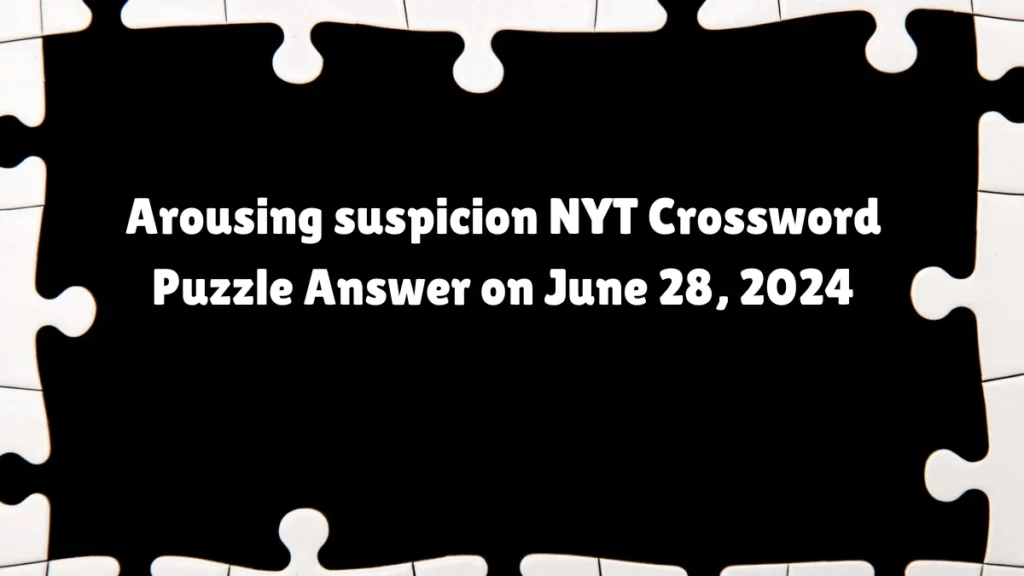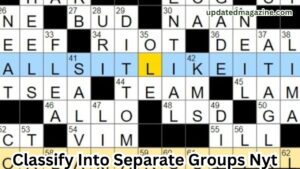Introduction to Arousing Suspicion NYT Crossword Clue
“Arousing Suspicion NYT” encapsulates a significant aspect of how the New York Times engages its readers through both its reporting and its crossword puzzles. In journalism, arousing suspicion involves presenting information that prompts readers to question the validity or integrity of certain events or figures. This technique is not only effective in investigative reporting but also finds its way into the NYT crossword puzzles, where clues like “arousing suspicion” challenge solvers to think critically and connect words with nuanced meanings. For instance, the answer to this clue, FISHY, reflects a common sentiment of doubt, illustrating how language in both journalism and puzzles can provoke thought and discussion among audiences. By
What Does “Arousing Suspicion” Mean?
The phrase “arousing suspicion” refers to creating a sense of doubt or mistrust regarding a situation, person, or event. In the context of crossword puzzles, it often leads to words that convey a sense of unease or skepticism.
For example, the answer to the crossword clue “arousing suspicion,” as seen in the NYT Mini Crossword on June 28, 2024, is FISHY. This five-letter word is commonly used to describe something that seems suspicious or not quite right.
The Answer: FISHY
The answer FISHY is derived from the adjective’s definition, which implies something that is not as expected or raises doubts. In crossword puzzles, clues often require solvers to think outside the box and consider synonyms or related terms that fit the given number of letters.
In this case, “arousing suspicion” aligns perfectly with the connotation of “fishy,” making it a fitting answer. The word itself can evoke images of something that smells off or feels wrong, which is why it resonates well with the concept of suspicion.
How Crossword Answers Are Derived
Crossword puzzles, particularly those in the NYT, are crafted with care to ensure they challenge and engage solvers. Here’s a breakdown of how answers like “FISHY” are derived:
- Clue Interpretation: The first step for a solver is to interpret the clue accurately. Understanding the nuances of the words used is essential. For “arousing suspicion,” recognizing that it hints at something suspicious is key.
- Word Length: The number of letters in the answer is crucial. In this case, the clue specifies a five-letter word, which narrows down the possibilities significantly.
- Synonyms and Associations: Solvers often rely on synonyms or related words. For “arousing suspicion,” terms like “dubious,” “peculiar,” or “fishy” come to mind. However, only “FISHY” fits the letter count.
- Cross-Referencing: Crossword puzzles often have intersecting words. Solvers can use letters from other answers to help confirm their guesses. If “FISHY” fits with adjacent clues, it provides additional validation.
- Cultural Context: Many crossword clues draw from cultural references, idioms, or common phrases. Understanding these can help in deciphering more obscure clues.
The Significance of Crossword Clues
Crossword clues like “arousing suspicion” serve multiple purposes in puzzles:
- Vocabulary Expansion: They introduce solvers to new words and concepts, enhancing their language skills.
- Critical Thinking: Solving crosswords requires analytical thinking and problem-solving skills, as solvers must connect disparate pieces of information.
- Cultural Reflection: Many clues reflect societal trends, idioms, or current events, providing insight into the collective consciousness of the time.
Related Crossword Answers
While “FISHY” is the most recent answer to the clue “arousing suspicion,” other potential answers include:
- PECULIAR (8 letters): This word also conveys a sense of strangeness or oddity, fitting the theme of suspicion.
- DUBIOUS (7 letters): This term implies doubtfulness and can also relate to suspicion.
- EVOKE (5 letters): While not a direct synonym, it can imply stirring feelings of suspicion.
These related terms showcase the diversity of language and thought that crossword puzzles encourage.
The Evolution of Crossword Puzzles
Crossword puzzles have evolved significantly since their inception in the early 20th century. Initially, they were simple word games, but they have grown into complex challenges that require a deep understanding of language, culture, and trivia.
The NYT crossword, in particular, has gained a reputation for its high-quality clues and answers. It often includes contemporary references and clever wordplay, making it a favorite among avid puzzlers.
Tips for Solving Crossword Puzzles
For those looking to improve their crossword-solving skills, here are some helpful tips:
- Start with the Easy Clues: Begin with clues you know to fill in some letters, which can help with more challenging ones.
- Look for Common Patterns: Certain words or phrases frequently appear in crosswords. Familiarize yourself with these to gain an edge.
- Practice Regularly: The more you practice, the better you’ll become at recognizing patterns and clues.
- Use Online Resources: Websites and apps can provide hints or answers when you’re really stuck.
- Join a Community: Engaging with other crossword enthusiasts can provide insights and tips that enhance your skills.
Conclusion
The clue arousing suspicion NYT crossword serves as an excellent example of how language can be playful yet thought-provoking. The answer FISHY encapsulates the essence of suspicion in a succinct way, illustrating the cleverness of crossword construction.
Crossword puzzles are not just games; they are a form of art that challenges our minds and expands our vocabulary. By understanding how clues are constructed and the significance behind them, solvers can deepen their appreciation for this timeless pastime.
Also Read: https://guia-automovil.com/2020/10/02/mejores-autos-del-2020
FAQs
What does “arousing suspicion” mean in crossword puzzles?
“Arousing suspicion” refers to creating doubt or mistrust, often leading to answers that convey a sense of skepticism.
What is the answer to the clue “arousing suspicion” in the NYT Mini Crossword?
The answer is FISHY, a five-letter word that suggests something is not quite right.
How are crossword clues created?
Crossword clues are crafted by considering synonyms, word length, cultural references, and the overall theme of the puzzle.
What skills do crossword puzzles help develop?
Crossword puzzles enhance vocabulary, critical thinking, and problem-solving skills.
How can I improve my crossword-solving skills?
Practice regularly, start with easier clues, look for patterns, and engage with crossword communities for tips.












